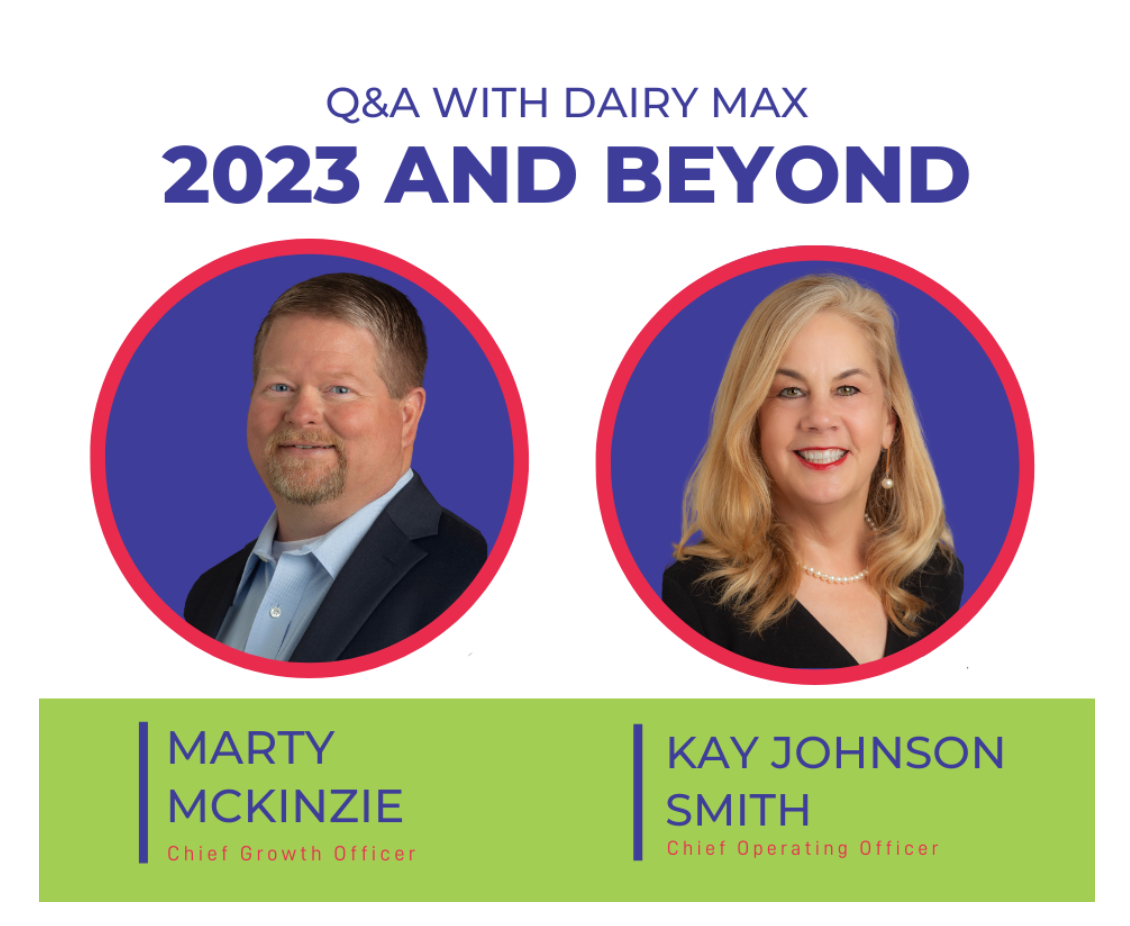Marty McKinzie and Kay Johnson Smith answer questions about Dairy MAX's work in 2023.
Dairy MAX will hit the ground running in 2023 to fulfill its mission of advocating with purpose by connecting dairy experiences with hearts, minds, and communities everywhere. The nonprofit regional dairy council represents over 900 dairy farmers in eight states. Dairy MAX aligns its program strategy by focusing on the three strategic pillars: sales, trust, and team. Earlier in 2022, it announced the promotion of Marty McKinzie, previously vice president of industry image and relations, to chief growth officer and the addition of Kay Johnson Smith as chief operating officer. While preparing for the new year, McKinzie and Johnson Smith sat down to recap 2022 and talk about the growth of Dairy MAX in their new roles in 2023.
Q: Looking back over the last year, what are some key wins for Dairy MAX and Checkoff?
McKinzie: I'm proud of the work that we've done in esports and the relationship with Complexity. Complexity is a professional esports team that can influence a large demographic of gamers in the Gen Z-Millennial age group from an influencer standpoint. We also established another partnership with Optic, one of the most notable esports organizations in the world, where we are an official nutrition partner.
Considering how we evolved during COVID and the challenges presented, our focus shifted to food banks and the current needs. Many of these food banks have the opportunity to purchase food and realize the nutritional benefits dairy provides, but we learned they did not have a mechanism to store dairy. There is a significant amount of milk pounds that are going through food banks. This opportunity opened a sales channel for the dairy industry. Our partnership with food banks led to the establishment of a cooler program where we have placed coolers in food banks to facilitate the delivery and availability of dairy products.
Q: Explain the importance of partnerships to the dairy checkoff?
Johnson Smith: I always say we can't do it alone. By leveraging partnerships and external relationships, we can reach more people and support our farmers while building trust.
McKinzie: Not only can we not do it alone, but the investment it takes and the resources it takes should not be the farmer's responsibility alone.
Q: With the reorganization, you have talked about your focus a little. What drove DMX to reorganize?
McKinzie: If you look back organizationally, Dairy MAX has grown geographically. Several years ago, the organization was responsible for Texas, New Mexico, the western two-thirds of Oklahoma, and the Southwest corner of Kansas. In the last five years, we have grown through a merger with Western Dairy Association and increased our geography to include Colorado, Wyoming, Montana, and, shortly after, Louisiana through a partnership opportunity. At the time of the mergers, with the increase in our size and reach, we wanted to ensure that the people doing the work were where they needed to be and that departments fully staffed could conduct the job effectively. One area not adjusted at that time was management, particularly upper management. We had a sound system in place and an excellent strategy to expand from a work standpoint, but the leadership and management at the highest level was something that Mike Konkle, our CEO, had taken upon himself for the last five years.
Johnson Smith: Coming from the Animal Ag Alliance and running a national organization for 27 years, I hope to bring some of that operational understanding to Dairy MAX to help streamline some of our processes and assist with collaboration and communication across departments, providing for more cohesiveness to the organization.
Q: Share the work done with strategic planning regarding 'DMX's strategic pillars of sales, trust, and team.
McKinzie: We have done strategic planning for quite a while. But we have evolved in our approach; it's allowed for a more collaborative and cohesive opportunity to bring focus to sales, trust, and team. Sales are essential to our dairy farmers as we look to increase dairy consumption. The trust element and the industry's reputation certainly lend themselves to making purchase decisions and having confidence in the nutrition and value of dairy products. From a team aspect, we work for dairy farmers, which is at the forefront of our mission as a company. So, together we are constantly focusing on ensuring we have the skill sets to attribute all we can to the hard-working dairy farm families across the region we serve.
Johnson Smith: Marty summed it up well about what our priorities are. Looking long term, one of our values is being forward-thinking. This strategic planning process is for a three-year period that allows us to be a little more aspirational and more forward-thinking. With established checkpoints over the three years, we can ensure we're staying on track and allowing for adjustments along the way. The other point that I would add is the team commitment. We've been intentional about team engagement because we can do more together on behalf of the dairy industry and our farmers. This process ensures we work together as a team, being more intentional in our efforts in the different departments and looking at shared projects and goals.
Q: As we move into 2023, what are the key focus areas for Dairy MAX?
Johnson Smith: Last year, Dairy MAX invested in research to better understand the demographics of the region we serve. It's essential to understand who our consumers are throughout our region. When you look from Louisiana to Texas to Colorado, all the way up to Montana, it's a very diverse consumer base, and every state is different. This investment shows Dairy MAX's commitment to being insights-driven. Not everybody grew up with dairy necessarily as a natural part of their diet, or they may have reservations about it. So, this year in 2023, we will do more research on dairy perceptions among our consumers in our diverse region. We will use that information to inform our communications and outreach because we need to meet people where they are. We need to understand their likes, dislikes, concerns, reservations, and biases that they may have for or against dairy and tailor our messaging and communications outreach to them to have an impact.
Q: How does the dairy industry create a holistic approach to have true long-term sustainability and define it where it makes sense to so many people?
McKinzie: When you look at sustainability, we must tie it to nutrition regardless of your definition. As an industry, we have highlighted the value of sustainable nutrition. We must communicate to the consumer the value of the nutrition they are receiving, and the relatively small costs environmentally compared to the value of food. Dairy foods provide about 54% of the calcium, 56% of the vitamin D, and 18% of the protein consumed by Americans, which is a small price in environmental terms with less than two percent of all U.S. greenhouse gas emissions and roughly five percent of the water to get that type of nutritional value.
Q: Dairy MAX has been a leader in issues and crises. When we think of issues and crises, the first thing we think of is animal activism. Tell us how the organization will collaborate to protect the dairy's image and reputation moving forward.
Johnson Smith: It is more than activists. I know that's what people tend to think of, and we often do, but it could be everything from natural disasters, food safety issues, regulations, or what's happening in other countries. We need to be on the lookout for many problems, not just activism. We want to understand the vulnerabilities across our departments and potential issues for all our stakeholders.
Q: How is DMX working to help but also expand programs and amplify National programming?
Johnson Smith: For me, we are elevating the work stream on issues and crises. With my background from the Animal Ag Alliance and having now a dedicated team focused on issues and crises, we will be able to enhance the foundation Dairy MAX has built. They've done a great job being proactive in telling your story training, the crisis drills, and establishing resources and protocols for handling a crisis.
McKinzie: As it relates to sustainability, specifically as a new work area within Dairy MAX and under my new role, there's a tremendous amount of focus on research within the dairy industry. The dairy industry has a long history of improving sustainability. Over the last 70 years, we've reduced our carbon footprint by two-thirds. We're producing more milk today, with nine million cows, than 70 years ago, with 26 million cows. So that is the definition of sustainability, doing more with less. Our dairy farmers are increasing that efficiency and being more sustainable in the dairy industry. Communicating about that will be crucial, not only what we have done to this point but what we are looking to do in the future. Over the last six months, I have focused many of my efforts on identifying new opportunities. For example, there are some excellent options with our regional universities. We have a robust system through extension with our dairy extension specialists, and many of them are engaged in sustainability and different aspects of research.




